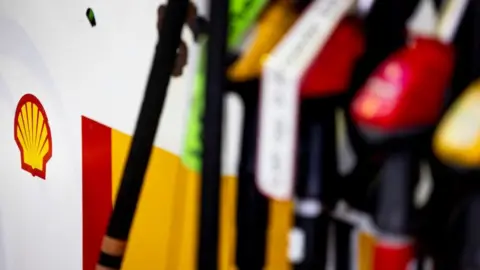Shell to sell Russian investments due to Ukraine conflict
 Getty Images
Getty ImagesShell is to end all of its joint ventures with the Russian energy company Gazprom following the invasion of Ukraine.
The move will include the oil giant's 27.5% stake in a major liquefied natural gas plant.
Shell's chief executive, Ben van Beurden, said the company was "shocked by the loss of life in Ukraine".
It follows similar moves by BP, which is to offload its share in Russian state-owned oil firm Rosneft.
Shell will quit the flagship Sakhalin II facility, which is 50% owned and operated by Gazprom.
It will also sell its 50% stake in two Siberian oilfield projects, as well as end its involvement in the Nord Stream 2 gas pipeline from Russia to Germany, which it helped finance among a mix of other companies. The 1,200km pipeline under the Baltic Sea had already been put on hold by German ministers.
In a statement issued on Monday, Shell said that it expected the move, which will also apply to any "related entities" to Gazprom, would be worth about $3bn (£2.2bn).
The associated costs will be marked on its balance sheet later this year.
'We will not stand by'
"Our decision to exit is one we take with conviction," Mr van Beurden said.
"We cannot - and we will not - stand by", he added, describing Russia's actions as "a senseless act of military aggression which threatens European security".
Business Secretary Kwasi Kwarteng voiced his support for Shell's decision on social media.
Allow X content?
Foreign Secretary Liz Truss had earlier named Gazprom as one of the many Russian companies who would be unable to access any funding from UK financial institutions as part of new sanctions.
As part of the new measures announced, the European Union (EU), US, UK and allies have agreed to remove selected Russian banks from the Swift messaging system, which enables the smooth transfer of money across borders. The move is intended to cut Russia off from the international financial system and to "harm their ability to operate globally".
Major Russian banks are also having their assets frozen and being excluded from the UK financial system. This stops them from accessing pound sterling and clearing payments through the UK.
And several governments have imposed sanctions on some individuals, including Russia's President Vladimir Putin, the Foreign Minister Sergei Lavrov and a number of members of Russia's oligarch elite.
Shell's decision follows that of BP, which announced that it would offload its stake in the Russian state-owned oil firm Rosneft, which it has held since 2013.
BP boss Bernard Looney also said he would resign from the board of Rosneft with "immediate effect", having played a part on it since 2000, alongside chairman Igor Sechin, who is a close friend of Russian President Vladimir Putin.

'A reckoning for company boardrooms'

Shell didn't take long to follow BP to the exit from Russian oil and gas interests.
While nowhere near the scale of BP's potential $25bn (£18.7bn) hit, Shell could see a charge of up to $3bn (£2.2bn) as it offloads any interests in which it is a partner with state-owned gas giant Gazprom.
As with BP, it is unclear how or to whom these businesses will be offloaded and whether they are worth anything.
This will not be the last global company to bring decades-long collaborations to a financially damaging end.
Russia's rapidly-acquired pariah status is prompting a reckoning for company boardrooms around the world.
It has also prompted a major rethink for the UK government.
Business Secretary Kwasi Kwarteng applauded the decisions by BP and Shell to yield to pressure he helped apply personally. It seems clear the UK government thinks it can no longer afford to be seen - as successive UK governments in the past have been - as an accommodating, unquestioning friend to Russian capital.

BP said it was too early to say how or to whom its stake in Rosneft would be sold.
The firm will pay an $11bn charge when it writes off foreign exchange losses that have accumulated over the last few years and another charge relating to the value of its stake.
Norwegian oil and gas producer Equinor also announced its exit from Russia on Monday, as it said it would begin the process of divesting from its joint ventures in the country.
It said the ongoing conflict meant its position was "untenable".
Canadian Prime Minister Justin Trudeau has also announced that Canada will ban crude oil imports from Russia.
